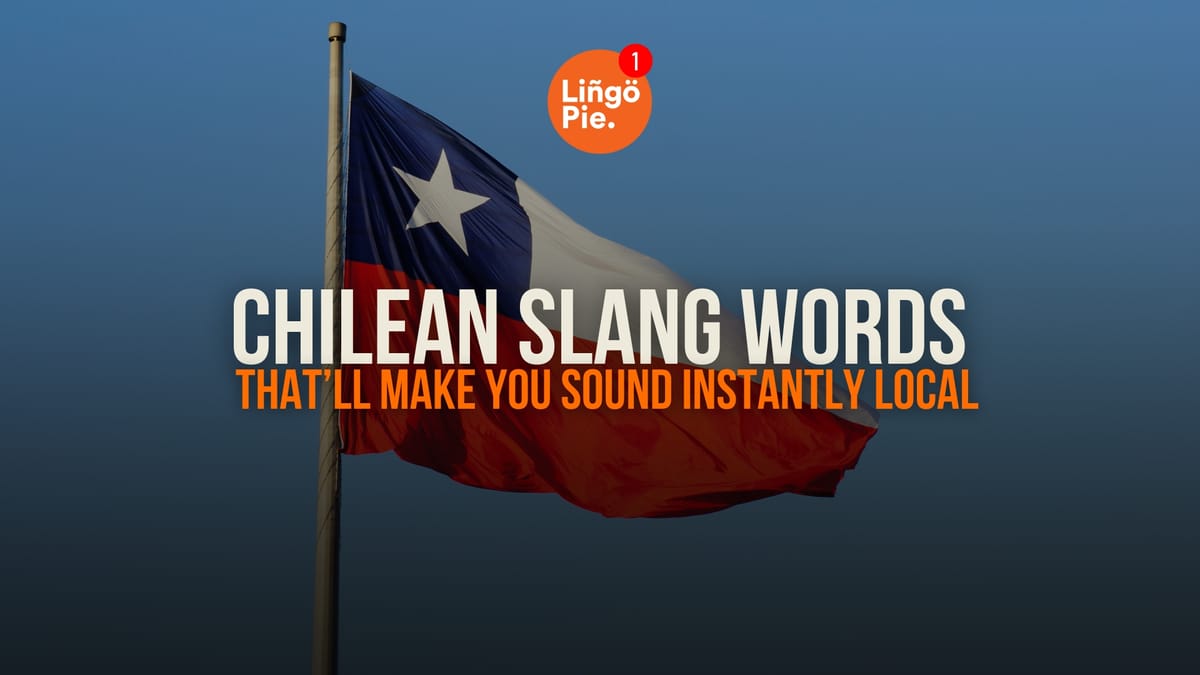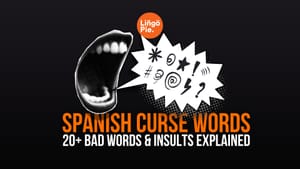Yes, Chileans speak Spanish ... but with their own special twist! If you've studied Spanish or visited other Spanish-speaking countries, you'll quickly notice how different it sounds in Chile. People often speak quickly, drop sounds, and rely on expressions you won’t find in a language app or classroom. Some expressions don't even have direct translations!
These expressions, known as chilenismos, are part of everyday life and are essential if you want to keep up with conversations. And just like how Irish slang gives everyday English its own distinct flavor, Chilean slang adds personality and humor to the way people speak.
In this guide, you’ll find 20 of the most common Chilean slang terms explained in simple terms, so you can understand them, use them, and feel more at home in Chile.
- 31 Colombian Slang & Bad Words EXPLAINED (+ Audio!)
- 18+ Miami Slang Words And Phrases You’ll Hear In The 305
- 24+ Easy Cuban Slang Words That Only Locals Understand

Why Learn Chilean Slang?
Chilean Spanish is filled with expressions that shape the way people actually communicate. Slang appears in daily conversations, on television, in classrooms, and in the workplace. Without it, even someone fluent in standard Spanish can feel lost or left out of what is really being said. Knowing these words and phrases gives you the tools to follow conversations more easily and participate with confidence.
- You can understand casual conversations and inside jokes
- You sound more natural and approachable in everyday situations
- You show genuine interest in Chilean culture and community
- You avoid confusion when familiar words carry different meanings
- You feel more comfortable navigating daily life in Chile
Popular Chilean Slang Words And Phrases
Weón / Weóna
One of the most common Chilean slang words, but also one of the trickiest. Weón (or weóna for women) can mean “guy,” “dude,” or “friend” in a friendly way, but in another tone it can mean “idiot” or “jerk.”
¿Cachai?
Literally derived from the English word “catch,” this is the Chilean equivalent of “you get it?” or “you know?” It’s sprinkled at the end of sentences to confirm understanding or create connection in conversation. You’ll hear it constantly in Chilean Spanish, almost like a punctuation mark in speech.
Po (sí po / no po / ya po)
Unique to Chile, po doesn’t have a real meaning on its own. It’s a particle used to emphasize what you’re saying, often tacked onto sí (yes), no (no), or ya (come on). Think of it as Chile’s way of doubling down on a statement and making it sound more natural in conversation.
Bacán
This is Chile’s go-to word for “cool,” “awesome,” or “great.” It’s positive, upbeat, and used by all ages. If something is bacán, it’s definitely a good thing. Simple and always flattering.
Fome
The opposite of bacán. Something fome is boring, dull, or lame. People use it for a bad movie, an uneventful party, or even a person who isn’t very fun to be around. It’s a very everyday, casual word.
Cuático
This word describes something or someone that’s extreme, dramatic, or over-the-top. It can be used for situations that are intense or when someone is making a big deal out of nothing. Chileans love to exaggerate with cuático.
La raja
Although it literally means “the butt,” in Chile it’s a compliment. If something is la raja, it means it’s fantastic or amazing. Very informal and used mostly among friends, but it’s one of the strongest ways to express that something was awesome.
Al tiro
This is Chile’s way of saying “right away” or “immediately.” If someone says they’ll do something al tiro, they mean they’ll do it now. However, in practice it can mean “soon” rather than literally “this instant,” depending on the person.
Pololo / Polola (Pololear)
These words are central to Chilean dating culture. A pololo is a boyfriend, a polola is a girlfriend, and pololear means to date. Aside form flirting, it also implies an actual relationship, and it’s how Chileans talk about romantic partners before marriage.
Carrete (Carretear)
This is the Chilean word for “party” and the verb “to party.” A carrete can be anything from a casual get-together with friends to a big house party. If someone invites you to a carrete, expect drinks, music, and a lot of socializing.
Copete
General slang for alcoholic drinks. Any type of booze falls under copete. If you’re “going for copete,” you’re going out for drinks with friends. It’s an essential word for nightlife vocabulary in Chile.
Luca
Money talk in Chile always involves slang. A luca means one thousand Chilean pesos. Prices are often expressed this way in casual conversation. For example, something costing 5,000 pesos will be called “cinco lucas.”
Gamba
Another money term. A gamba usually refers to one hundred pesos. It’s often used when talking about small change or minor amounts of money, but it’s a must-know if you’re handling everyday transactions.
Pega
This is Chilean slang for “work” or “job.” It’s used informally to talk about employment. If someone says they have pega, it means they have work to do or a job to go to.
Pituto
Refers to getting something (usually a job or an opportunity) through connections rather than merit or formal processes. Having a pituto is having a hook-up or contact who can open doors for you. It’s very common in discussions about the job market in Chile.
Caleta
Means “a lot” or “tons of.” It can refer to quantity, time, or intensity. Chileans use it constantly to emphasize abundance, whether it’s people, food, or love. It’s very versatile and deeply ingrained in everyday speech.
Guagua
Chilean Spanish word for “baby.” Unlike in other countries, where guagua can mean different things, in Chile it’s universally understood as an infant or very small child. Parents and grandparents use it all the time.
La micro
The colloquial term for a city bus. Public transportation in Chile revolves around micros, so this is essential if you’re navigating Santiago or other big cities. You’ll rarely hear Chileans just say “bus.”
Taco
In Chile, a taco doesn’t mean food—it means a traffic jam. If someone says there was a taco, they’re talking about congestion on the road, not dinner. It’s an everyday complaint in Chilean cities.
Buena onda
Literally “good wave,” this phrase describes good vibes, positive energy, or a nice person. If someone is buena onda, they’re friendly, pleasant, and fun to be around. It’s both a compliment and a way to describe atmospheres or situations.
Tips for Using Chilean Spanish Slang
Learning Chilean slang is exciting, but using it correctly can be tricky. Here are a few tips to help you sound natural without getting into awkward situations:
1. Pay Attention to Context
Many Chilean slang words change meaning depending on tone and who you’re talking to. For example, weón can be friendly or insulting. Listen closely to how locals use it before trying it yourself.
2. Start with the Safe Words
Words like bacán (awesome), fome (boring), or buena onda (good vibes) are positive and easy to use without risk. Begin with these to build confidence before venturing into slang that’s more sensitive.
3. Be Mindful of Formal Situations
Slang is best kept for casual conversations with friends, peers, or people your age. In job interviews, business settings, or when speaking with elders, stick to standard Spanish.
4. Listen More Than You Speak
At first, focus on listening to how Chileans weave slang into everyday talk. Once you’re comfortable with the rhythm and tone, try adding it naturally to your speech instead of forcing it.
5. Learn Through Media
One of the easiest and most fun ways to get slang into your ear is by watching Chilean shows, music, and conversations. Platforms like Lingopie, which offers Spanish telenovelas and series with subtitles, are excellent for hearing slang in real contexts. You’ll pick up not only the vocabulary but also the speed and rhythm of Chilean Spanish.
Level Up Your Spanish With Lingopie
If you want to go beyond memorizing vocabulary and actually live the language, the best way is through authentic content. Lingopie makes this easy by giving you access to Spanish telenovelas, series, and movies with dual subtitles. Even with a trial account, you can watch, listen, and pick up real conversational Spanish in a natural and enjoyable way.
Instead of studying in a textbook vacuum, you’ll hear how people really speak and absorb slang, tone, and rhythm effortlessly. It’s simply one of the most fun and effective tools for improving your Spanish. Give Lingopie a try today and see how fast your Spanish skills take off.





![Foreigner's Guide To Hangeul Day In Korea [2026]](/blog/content/images/size/w1200/2024/10/Apprendre-Des-Gros-Mots-Faciles-En-Allemand-2.png)
![19 Best Spanish Series For Learning Spanish Fast [2026]](/blog/content/images/size/w300/2025/04/best-shows-to-watch-to-learn-spanish.jpg)
![How to Learn Spanish with News in Easy Spanish [Guide]](/blog/content/images/size/w300/2024/12/How-to-Learn-Spanish-with-News-in-Easy-Spanish.jpg)
![80 Spanish Love Words Every Romantic Should Know [Guide]](/blog/content/images/size/w300/2025/10/spanish-love-words.jpg)
